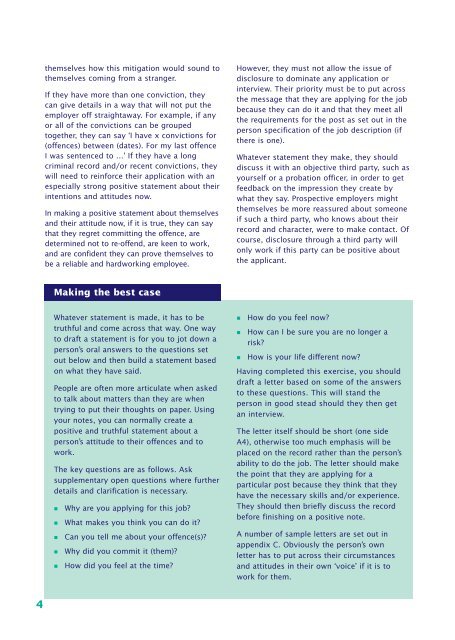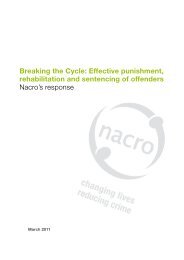Applying for work (with a criminal record): resettlement - Nacro
Applying for work (with a criminal record): resettlement - Nacro
Applying for work (with a criminal record): resettlement - Nacro
Create successful ePaper yourself
Turn your PDF publications into a flip-book with our unique Google optimized e-Paper software.
4<br />
themselves how this mitigation would sound to<br />
themselves coming from a stranger.<br />
If they have more than one conviction, they<br />
can give details in a way that will not put the<br />
employer off straightaway. For example, if any<br />
or all of the convictions can be grouped<br />
together, they can say ‘I have x convictions <strong>for</strong><br />
(offences) between (dates). For my last offence<br />
I was sentenced to …’ If they have a long<br />
<strong>criminal</strong> <strong>record</strong> and/or recent convictions, they<br />
will need to rein<strong>for</strong>ce their application <strong>with</strong> an<br />
especially strong positive statement about their<br />
intentions and attitudes now.<br />
In making a positive statement about themselves<br />
and their attitude now, if it is true, they can say<br />
that they regret committing the offence, are<br />
determined not to re-offend, are keen to <strong>work</strong>,<br />
and are confident they can prove themselves to<br />
be a reliable and hard<strong>work</strong>ing employee.<br />
Making the best case<br />
Whatever statement is made, it has to be<br />
truthful and come across that way. One way<br />
to draft a statement is <strong>for</strong> you to jot down a<br />
person’s oral answers to the questions set<br />
out below and then build a statement based<br />
on what they have said.<br />
People are often more articulate when asked<br />
to talk about matters than they are when<br />
trying to put their thoughts on paper. Using<br />
your notes, you can normally create a<br />
positive and truthful statement about a<br />
person’s attitude to their offences and to<br />
<strong>work</strong>.<br />
The key questions are as follows. Ask<br />
supplementary open questions where further<br />
details and clarification is necessary.<br />
� Why are you applying <strong>for</strong> this job?<br />
� What makes you think you can do it?<br />
� Can you tell me about your offence(s)?<br />
� Why did you commit it (them)?<br />
� How did you feel at the time?<br />
However, they must not allow the issue of<br />
disclosure to dominate any application or<br />
interview. Their priority must be to put across<br />
the message that they are applying <strong>for</strong> the job<br />
because they can do it and that they meet all<br />
the requirements <strong>for</strong> the post as set out in the<br />
person specification of the job description (if<br />
there is one).<br />
Whatever statement they make, they should<br />
discuss it <strong>with</strong> an objective third party, such as<br />
yourself or a probation officer, in order to get<br />
feedback on the impression they create by<br />
what they say. Prospective employers might<br />
themselves be more reassured about someone<br />
if such a third party, who knows about their<br />
<strong>record</strong> and character, were to make contact. Of<br />
course, disclosure through a third party will<br />
only <strong>work</strong> if this party can be positive about<br />
the applicant.<br />
� How do you feel now?<br />
� How can I be sure you are no longer a<br />
risk?<br />
� How is your life different now?<br />
Having completed this exercise, you should<br />
draft a letter based on some of the answers<br />
to these questions. This will stand the<br />
person in good stead should they then get<br />
an interview.<br />
The letter itself should be short (one side<br />
A4), otherwise too much emphasis will be<br />
placed on the <strong>record</strong> rather than the person’s<br />
ability to do the job. The letter should make<br />
the point that they are applying <strong>for</strong> a<br />
particular post because they think that they<br />
have the necessary skills and/or experience.<br />
They should then briefly discuss the <strong>record</strong><br />
be<strong>for</strong>e finishing on a positive note.<br />
A number of sample letters are set out in<br />
appendix C. Obviously the person’s own<br />
letter has to put across their circumstances<br />
and attitudes in their own ‘voice’ if it is to<br />
<strong>work</strong> <strong>for</strong> them.

















